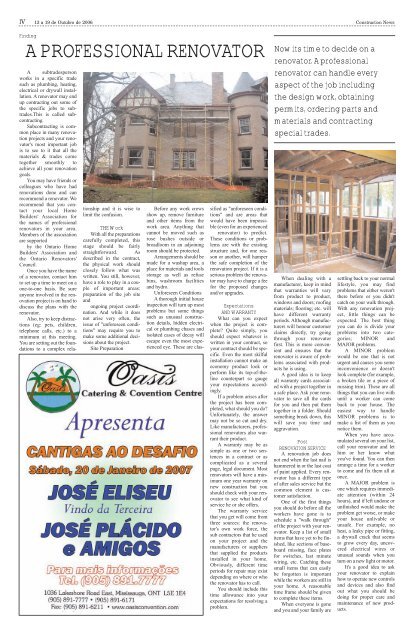Alexandre Franco - ANO: LXXV – EDIÇÃO Nº 3906 - Post Milenio
Alexandre Franco - ANO: LXXV – EDIÇÃO Nº 3906 - Post Milenio
Alexandre Franco - ANO: LXXV – EDIÇÃO Nº 3906 - Post Milenio
Create successful ePaper yourself
Turn your PDF publications into a flip-book with our unique Google optimized e-Paper software.
IV<br />
13 a 19 de Outubro de 2006<br />
Construction News<br />
Finding<br />
A PROFESSIONAL RENOVATOR<br />
A subtradesperson<br />
works in a specific trade<br />
such as plumbing, heating,<br />
electrical or drywall installation.<br />
A renovator may end<br />
up contracting out some of<br />
the specific jobs to subtrades.This<br />
is called subcontracting.<br />
Subcontracting is common<br />
place in many renovation<br />
projects and your renovator's<br />
most important job<br />
is to see to it that all the<br />
materials & trades come<br />
together smoothly to<br />
achieve all your renovation<br />
goals.<br />
You may have friends or<br />
colleagues who have had<br />
renovations done and can<br />
recommend a renovator. We<br />
recommend that you contact<br />
your local Home<br />
Builders' Association for<br />
the names of professional<br />
renovators in your area.<br />
Members of the association<br />
are supported<br />
by the Ontario Home<br />
Builders' Association and<br />
the Ontario Renovators'<br />
Council.<br />
Once you have the name<br />
of a renovator, contact him<br />
to set up a time to meet on a<br />
one-to-one basis. Be sure<br />
anyone involved in the renovation<br />
project is on hand to<br />
discuss the plans with the<br />
renovator.<br />
Also, try to keep distractions<br />
(eg: pets, children,<br />
telephone calls, etc.) to a<br />
minimum at this meeting.<br />
You are setting out the foundations<br />
to a complex relationship<br />
and it is wise to<br />
limit the confusion.<br />
THE Work<br />
With all the preparations<br />
carefully completed, this<br />
stage should be fairly<br />
straightforward. As<br />
described in the contract,<br />
the physical work should<br />
closely follow what was<br />
written. You still, however,<br />
have a role to play in a couple<br />
of important areas:<br />
preparation of the job site<br />
and<br />
ongoing project coordination.<br />
And while it does<br />
not arise very often, the<br />
issue of "unforeseen conditions"<br />
may require you to<br />
make some additional decisions<br />
about the project.<br />
Site Preparation<br />
Before any work crews<br />
show up, remove furniture<br />
and other items from the<br />
work area. Anything that<br />
cannot be moved such as<br />
rose bushes outside or<br />
broadloom in an adjoining<br />
room should be protected.<br />
Arrangements should be<br />
made for a washup area, a<br />
place for materials and tools<br />
storage as well as refuse<br />
bins, washroom facilities<br />
and hydro.<br />
Unforeseen Conditions<br />
A thorough initial house<br />
inspection will turn up most<br />
problems but some things<br />
such as unusual construction<br />
details, hidden electrical<br />
or plumbing chases and<br />
isolated cases of decay will<br />
escape even the most experienced<br />
eye. These are classified<br />
as "unforeseen conditions"<br />
and are areas that<br />
would have been impossible<br />
(even for an experienced<br />
renovator) to predict.<br />
These conditions or problems<br />
are with the existing<br />
structure and, for one reason<br />
or another, will hamper<br />
the safe completion of the<br />
renovation project. If it is a<br />
serious problem the renovator<br />
may have to charge a fee<br />
for the proposed changes<br />
and/or upgrades.<br />
Expectations<br />
AND WARRANTY<br />
What can you expect<br />
when the project is complete?<br />
Quite simply, you<br />
should expect whatever is<br />
written in your contract, so<br />
your contract should be specific.<br />
Even the most skilful<br />
installation cannot make an<br />
economy product look or<br />
perform like its top-of-theline<br />
counterpart so gauge<br />
your expectations accordingly.<br />
If a problem arises after<br />
the project has been completed,<br />
what should you do?<br />
Unfortunately, the answer<br />
may not be so cut and dry.<br />
Like manufacturers, professional<br />
renovators also warrant<br />
their product.<br />
A warranty may be as<br />
simple as one or two sentences<br />
in a contract or as<br />
complicated as a several<br />
page, legal document. Most<br />
renovators will have a minimum<br />
one year warranty on<br />
new construction but you<br />
should check with your renovator<br />
to see what kind of<br />
service he or she offers.<br />
The warranty service<br />
that you get will come from<br />
three sources: the renovator's<br />
own work force, the<br />
sub contractors that he used<br />
on your project and the<br />
manufacturers or suppliers<br />
that supplied the products<br />
installed in your home.<br />
Obviously, different time<br />
periods for repair may exist<br />
depending on where or who<br />
the renovator has to call.<br />
You should include this<br />
time allowance into your<br />
expectations for resolving a<br />
problem.<br />
Now its time to decide on a<br />
renovator. A professional<br />
renovator can handle every<br />
aspect of the job including<br />
the design work, obtaining<br />
permits, ordering parts and<br />
materials and contracting<br />
special trades.<br />
When dealing with a<br />
manufacturer, keep in mind<br />
that warranties will vary<br />
from product to product,<br />
windows and doors; roofing<br />
materials; flooring; etc. will<br />
have different warranty<br />
periods. Although manufacturers<br />
will honour customer<br />
claims directly, try going<br />
through your renovator<br />
first. This is more convenient<br />
and ensures that the<br />
renovator is aware of problems<br />
associated with products<br />
he is using.<br />
A good idea is to keep<br />
all warranty cards associated<br />
with a project together in<br />
a safe place. Ask your renovator<br />
to save all the cards<br />
for you and then put them<br />
together in a folder. Should<br />
something break down, this<br />
will save you time and<br />
aggravation.<br />
<strong>Post</strong><br />
RENOVATION SERVICE<br />
A renovation job does<br />
not end when the last nail is<br />
hammered in or the last coat<br />
of paint applied. Every renovator<br />
has a different type<br />
of after sales service but the<br />
common element is customer<br />
satisfaction.<br />
One of the first things<br />
you should do before all the<br />
workers have gone is to<br />
schedule a "walk through"<br />
of the project with your renovator.<br />
Keep a list of small<br />
items that have yet to be finished,<br />
like sections of baseboard<br />
missing, face plates<br />
for switches, last minute<br />
wiring, etc. Catching these<br />
small items that can easily<br />
be forgotten is important<br />
while the workers are still in<br />
your home. A reasonable<br />
time frame should be given<br />
to complete these items.<br />
When everyone is gone<br />
and you and your family are<br />
settling back to your normal<br />
lifestyle, you may find<br />
problems that either weren't<br />
there before or you didn't<br />
catch on your walk through.<br />
With any renovation project,<br />
little things can be<br />
expected. The best thing<br />
you can do is divide your<br />
problems into two categories;<br />
MINOR and<br />
MAJOR problems.<br />
A MINOR problem<br />
would be one that is not<br />
urgent and causes you some<br />
inconvenience or doesn't<br />
look complete (for example,<br />
a broken tile or a piece of<br />
missing trim). These are all<br />
things that you can live with<br />
until a worker can come<br />
back to your house. The<br />
easiest way to handle<br />
MINOR problems is to<br />
make a list of them as you<br />
notice them.<br />
When you have accumulated<br />
several on your list,<br />
call your renovator and let<br />
him or her know what<br />
you've found. You can then<br />
arrange a time for a worker<br />
to come and fix them all at<br />
once.<br />
A MAJOR problem is<br />
one which requires immediate<br />
attention (within 24<br />
hours), and if left undone or<br />
unfinished would make the<br />
problem get worse, or make<br />
your house unlivable or<br />
unsafe. For example, no<br />
heat, a leaky pipe or fitting,<br />
a drywall crack that seems<br />
to grow every day, uncovered<br />
electrical wires or<br />
unusual sounds when you<br />
turn on a new light or motor.<br />
It's a good idea to ask<br />
your renovator to explain<br />
how to operate new controls<br />
and devices and also find<br />
out what you should be<br />
doing for proper care and<br />
maintenance of new products.

















